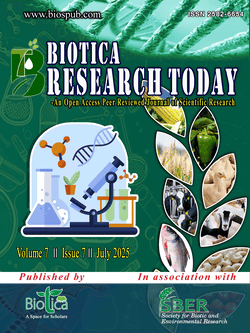
Carbon Negative Biochar Technology for Mitigating Methane Emissions
Rupa Kumpatla
Dept. of Soil Science, G.B. Pant University of Agriculture & Technology, Pantnagar, Uttarakhand (263 145), India
DOI: NIL
Keywords: Biochar, Fertility, Global warming, Sequestration
Abstract
Higher global warming and irregular climatic patterns significantly impacted ecosystems, mainly due to the increase in greenhouse gases from agriculture. Methane has emerged as a primary contributor among gases, hence the need to curb CH4 in combating global warming. Among the best mitigative options, the use of biochar, produced by charring crop residues at high temperature in reduced oxygen, emerges. The stable, high-carbon material sequesters soil carbon in addition to minimizing emission of CH4 and N2O. When applied to soil, biochar enhances crop productivity, improve resource use efficiency through sustainable conversion of crop residues. Its porous texture stimulates soil microbes, soil health and sustains long term fertility. Due to its permanence, the use of biochar constitutes an effective carbon capture and sequester instrument. When applied in broader sustainable applications, the material contributes significantly to climatic change mitigation in addition to the establishment of long-term resilient crops.
Downloads
not found
Reference
FAOSTAT, 2023. Methane emissions from cultivated rice fields. In: Food and Agriculture Organization (website). Available at: https://www.fao.org/faostat/en/#data/GPP. Accessed on: 21st June, 2025.
Fida Banu, M.R., 2023. Biochar: A sustainable solution for reducing greenhouse gas emissions. Biotica Research Today 5(3), 251-254.
Nandipamu, T.M.K., Nayak, P., Chaturvedi, S., Dhyani, V.C., Sharma, R., Tharayil, N., 2024. Biochar-led methanogenic and methanotrophic microbial community shift: Mitigating methane emissions. In: Biochar Production for Green Economy: Agricultural and Environmental Perspectives. (Eds.) Singh, S.V., Mandal, S., Meena, R.S., Chaturvedi, S. and Govindaraju, K. Academic Press. pp. 335-358. DOI: https://doi.org/10.1016/B978-0-443-15506-2.00014-6.
Singh, S., Chaturvedi, S., Nayak, P., Dhyani, V.C., Nandipamu, T.M.K., Singh, D.K., Gudapaty, P., Mathyam, P., Srinivasrao, K., Govindaraju, K., 2023. Carbon offset potential of biochar based straw management under rice-wheat system along Indo-Gangetic Plains of India. Science of the Total Environment 897, 165176. DOI: https://doi.org/10.1016/j.scitotenv.2023.165176.
Sriphirom, P., Chidthaisong, A., Yagi, K., Tripetchkul, S., Boonapatcharoen, N., Towprayoon, S., 2021. Effects of biochar on methane emission, grain yield and soil in rice cultivation in Thailand. Carbon Management 12(2), 109-121. DOI: https://doi.org/10.1080/17583004.2021.1885257.
